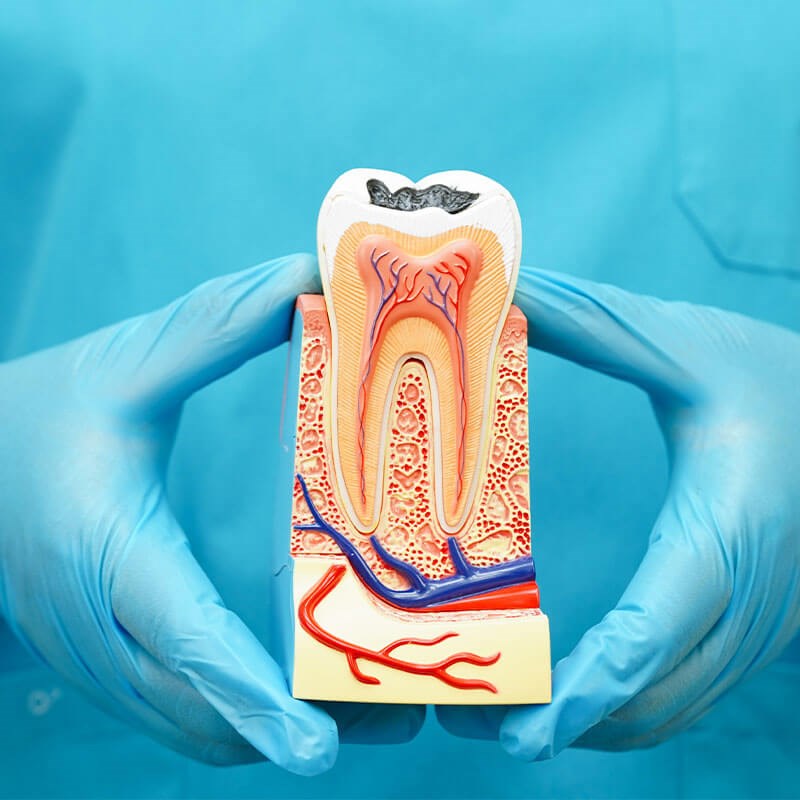Patient Information
What is an Endodontist?
An endodontist is a dentist who specializes in treating the inside of the tooth, or the root canal space. An endodontist undergoes an additional two or more years of training beyond dental school. This additional training is limited to endodontic procedures.
What is a Root Canal?
A root canal is the more familiar term for endodontic treatment. This procedure involves treatment of the inside of the tooth. During endodontic treatment, diseased pulp is removed. The inside of the tooth is carefully cleaned and disinfected before being filled and sealed.
Inflammation or infection of the tooth pulp is an indication that a root canal is necessary. The pulp is the soft tissue inside the tooth. The pulp contains blood vessels and nerve tissue.
It is important to treat inflamed, infected, or otherwise damaged teeth in a timely manner. If left untreated, more severe problems can occur such as an abscess, swelling, or bone loss. These problems can result in the loss of the tooth.
After root canal treatment, the tooth should be restored by your general dentist with a crown or other protective material.

Frequently Asked Questions
What is endodontic treatment?
Endodontic treatment deals with the treatment of the inside of the tooth. Root canal treatment is one of the most recognized of these treatments.
Understanding the anatomy of a tooth helps in understanding endondontic treatment. Inside the tooth, under the white enamel and a hard layer called dentin, is a soft tissue called pulp. This pulp contains blood vessels, nerves, and connective tissues that creates the surrounding hard tissues of the tooth during its development.
The pulp extends from the crown down to the tip of the roots where it connects to the surrounding tissues. Pulp is important during growth and development, but once fully matured a tooth can survive without it.
Endodontic treatment is required when the pulp becomes infected or inflamed. This can have a variety of causes, from deep decay, repeated dental procedures on the tooth, or a crack or chip. In addition, an injury to a tooth can cause pulp damage even if the tooth has no visible chip or crack. If untreated, this affected pulp can lead to pain or an abscess.
What are some signs that I may need endodontic treatment?
Signs that you may need a root canal include tooth pain and tooth sensitivity. It is also possible to need a root canal even if you are not experiencing obvious symptoms.
How does treatment save a tooth?
Years ago, diseased or injured teeth were often pulled (extracted). Deep cavities, large fillings, and severe cracks in teeth are common causes of damage to the tooth pulp. This damage can cause pain and/or swelling. Root canal treatment can often save teeth in these conditions by removing the pulp while restoring the tooth. Your general dentist can then restore the tooth to normal form and function. Therefore, endodontic treatment is often a better option than having the tooth pulled.
Is the procedure painful?
Many endodontic procedures are performed to relieve tooth pain caused by pulp inflammation or infection. With modern techniques and anesthetics, most patients report that they are comfortable during the root canal procedure.
Immediately following the root canal procedure, the tooth may feel tender, especially if there was tooth pain or infection before the root canal was performed. This discomfort can be relieved with over-the-counter or prescribed medication, as advised by your endodontist.
The treated tooth may feel slightly different from the other teeth for some time following the treatment. If severe tooth pain or pressure lasts for more than a few days, call your endodontist.
How much will the procedure cost?
The cost varies depending on how complex the problem is and which tooth is affected. Generally, endodontic treatment and the restoration of a natural tooth is less expensive than having a tooth extracted and replaced with an implant or bridge.
We accept all insurance. In some cases your insurance reimburses you directly. If so, you will pay us at the time of service and your insurance provider will reimburse you.
Patients who do not have insurance will be required to pay in full at the time of service.
Will the tooth need any special care or additional treatment after a root canal?
Tenderness and soreness in the area of treatment is normal and temporary, usually lasting only a few days. These symptoms respond well to over-the-counter anti-inflammatory medications such as ibuprofen (Advil) or naproxen (Aleve). True anti-inflammatories work best for this type of discomfort. If you are unable to take anti-inflammatory medication, you can get some relief by taking acetaminophen (Tylenol).
Please avoid chewing on the side of your mouth where the root canal treatment was performed until you have the tooth restored by your general dentist.
Do not chew anything until the numbness and anesthesia wear off. Very soft foods are recommended for the first few days.
Contact your general dentist soon after your root canal treatment is finished to arrange for the follow-up restoration.
What can cause a treated tooth to need further treatment?
A root canal can be considered a permanent procedure. However, new trauma, deep decay, or loose, cracked, or broken fillings can lead to a new infection in your tooth. In some cases an endodontist may discover additional narrow canals that could not be treated during the original procedure.
Can all teeth be treated endodontically?
Most teeth can be treated. Occasionally a tooth cannot be saved due to its position or a severe fracture. In addition, the amount and location of existing tooth decay may determine if the tooth can be saved.